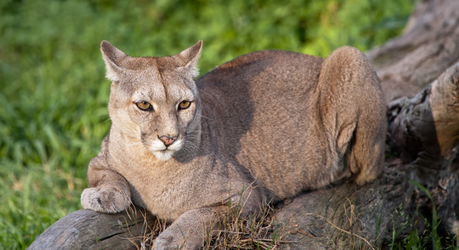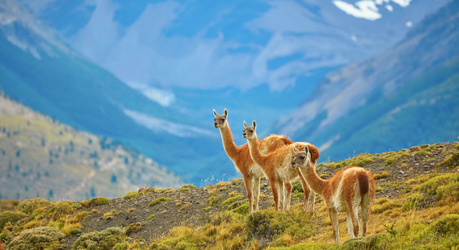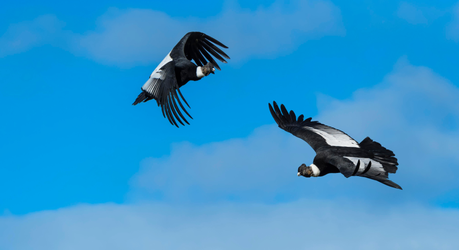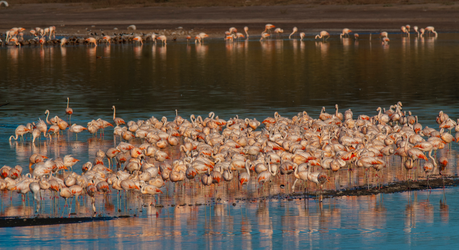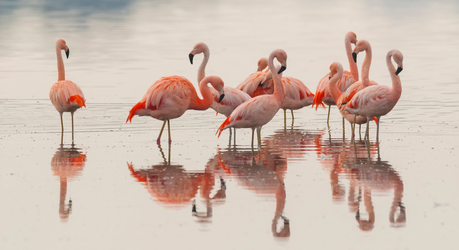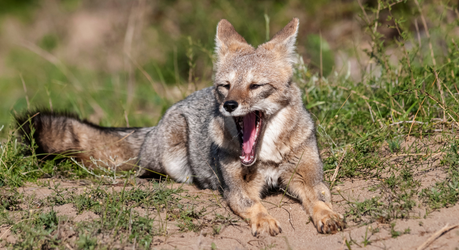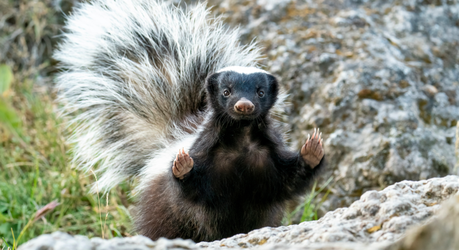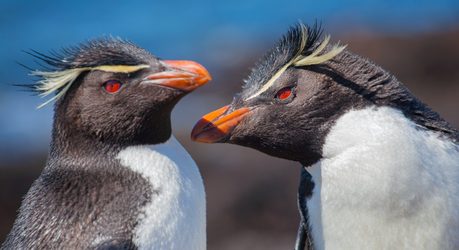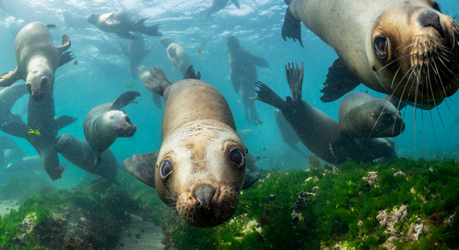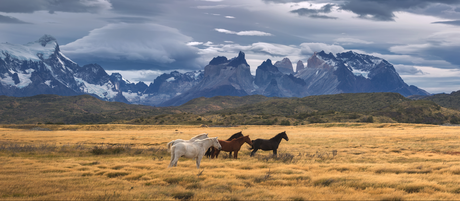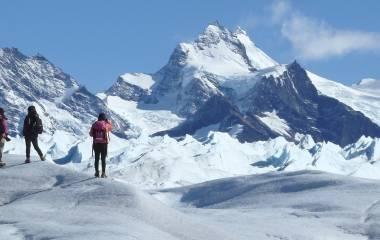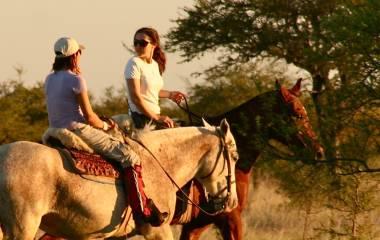Patagonia is a dramatic, windswept wilderness of glacier-cleaved landscapes. This vast region, spanning over 400,000 square miles of Argentina and Chile, has nine national parks, including Torres del Paine, Los Glaciares National Park, and the Valdes Peninsula. It is, without doubt, one of the foremost reasons to travel to South America.
Join one of our Patagonia trips to experience this incredible outback. You may spot a sleek Andean puma resting in the grasslands or guanacos scampering up rugged mountains. Catch sea lions and penguins that throng rocky ocean shores, or explore the promise of a wealth of marine life, from southern right whales to elephant seals and dolphins.
Our Patagonia hiking tours take you to majestic glaciers, across sprawling grasslands and lush forests, beside sparkling lakes and lagoons—with many opportunities to observe the region’s stunning terrain, its diverse animals and birds. Experience the wonder of Argentina’s wildlife on an immersive trip to Patagonia with stops at Puerto Madryn and the wetlands of Ibera.
On this virtual escape, we showcase a small fraction of Patagonia’s stunning wildlife.
Torres del Paine is among the best places in Patagonia to spot the elusive puma or mountain lion. Thanks to a sizeable population of guanacos, their main prey, these predators have found a sanctuary in this UNESCO-listed biosphere reserve in Chilean Patagonia. Pumas are solitary animals with excellent camouflage against the semi-arid landscape, making them hard to track. But hike into Torres del Paine with an expert guide, and you’ve got the best chance of coming face to face with this feline.
Guanacos are closely related to alpacas and llamas and can be found all across the steppes, scrublands, and mountains of Patagonia. These herbivores are built to survive in arid regions and, like their other cousin, the camel, can go without water for long periods, surviving on the moisture they get from plants they eat. They run like the wind at about 35 miles per hour, making them the second-fastest mammals in Patagonia after the puma, their chief predator.
Look up into the skies above Torres del Paine, and you’re likely to see the magnificent Andean condor, considered the world’s largest flying bird, with a 10-foot wingspan. These vultures survey the mountainside from the air with their sharp eyesight, looking for carcasses, their preferred meal. They are incredibly clever and strong birds, known to be able to fly 200 miles in a single day and rise to altitudes as high as 18,000 feet. You can also see them in Chile around Punta Arenas.
Another gorgeous bird that is a common sight in Patagonia, especially around lakes and lagoons, is the Chilean flamingo. These colorful birds live in large flocks, easily identified by their gray legs, pink knees and black bill. The best time to spot flocks of nesting flamingos is during the breeding season, which falls between the summer months of December and February. Chacabuco Valley in Chile and La Pampa in Argentina are good places to sight large colonies of these elegant migratory birds.
Native to this region, the Patagonian fox or South American gray fox is a small animal weighing between 5 and 12 lb. It is a highly adaptable scavenger that is comfortable in a variety of habitats, from dry Argentinian scrubland to frigid steppes. Although they are called foxes, these mammals are considered “false foxes” as the species is more closely related to dogs and wolves than foxes.
Found predominantly in the grasslands of Patagonia, the Humboldt’s hog-nosed skunk is a small, stocky mammal that feeds mainly on insects and smaller mammals. Also known as the Patagonian hog-nosed skunk, it has one or two white stripes running down the sides of its body. Skunks can project their offensive spray up to 15 or 20 feet, so it’s best to admire them from a safe distance!
Magellanic woodpeckers are the largest woodpeckers in South America and among the largest woodpeckers in the world. They are endemic to South America and thrive in Patagonia’s old-growth southern beech forests. Males have a fiery crimson head and crest, while females are all black with a hint of red at the base of the bill. They eat wood-boring grubs, beetles, and spiders and build cavity nests in large trees.
You will find the northernmost colony of southern rockhopper penguins on Penguin Island (Isla Pinguïno), near the port city of Puerto Deseado in the Santa Cruz province of Argentine Patagonia. These penguins have striking red eyes, orange beaks, and a crest of yellow. They brave strong ocean currents and hostile climatic conditions to reach their nesting sites on rocky shores. Their numbers are dwindling, and they face a grim future, their survival threatened by climate change, pollution, and overfishing.
Valdes Peninsula in Argentina’s Chubut province is a treasure trove of marine life. One of the area’s largest year-round residents is the South American sea lion. You can observe these impressive creatures when you sail to Puerto Piramides. Just outside the Peninsula is the coastal town of Puerto Madryn, where you can go swimming with sea lion pups or spot southern right whales.
The richness of Patagonia’s wildlife is unmatched. Come for the migrating Magellanic penguins and orcas, and stay for the southern giant petrels and elephant seals. In every corner of this expansive land, a brilliant series of wildlife encounters awaits you.
Do you want to discover the wealth of wildlife in Patagonia? Browse our itineraries that are packed with endless adventures and wildlife viewing. Reach out to our experts, and we’ll curate your personalized trip of a lifetime.
step into Patagonia’s wild side
let’s get started
Stargazing in Chile and Patagonia
12 Days:
$ 8,490 / person
Journey from the bustling streets of Santiago de Chile to the stunning Chilean Patagonia and Atacama, where we promise you will be seeing stars! Appreciate star constellations with your naked eye with trained astrologers, and witness the high-flying equipment that provides insights into our universe.
Details
Inquire
Argentina and Chile: Hiking in Patagonia
11 Days:
$ 7,590 / person
Step up for this unique Argentina and Chile tour as Patagonia is a hiker’s dream! Experience the spectacular jagged peaks, cleaving glaciers and turquoise lakes that give this region its fame.
Details
Inquire
Wildlife Wonders of Argentina
11 Days:
$ 4,290 / person
With this private Argentina tour, unearth the spectacular bio-diversity that the country has to offer. The vast and wild wetlands of Esteros del Iberá offer you a peaceful sojourn amid a pristine ecosystem, while in the beautiful bay area of Puerto Madryn, spend time watching sea lions, Patagonian penguins and majestic whales.
Details
Inquire
